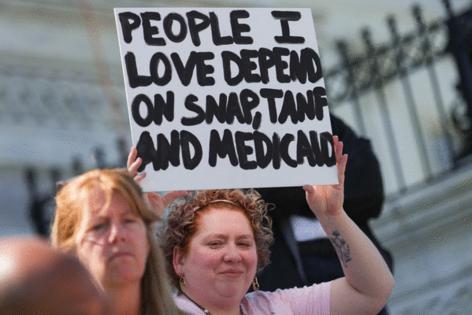Commentary: Cutting Medicaid harms kids and America's future
Published in Op Eds
As a pediatric resident in Texas, I have seen how important Medicaid is for my patients and their ability to access the care they need to thrive, and what can happen when there are gaps in that care.
Recently, I saw a child in clinic for her well-child visit. I noticed that she did not reach all her developmental milestones, although she had been on track in previous visits.
It was then that her family disclosed that she lost her Medicaid insurance, so she was no longer able to attend her therapy sessions that helped her advance in school. She had to repeat the 2nd grade, and now her parents are worried that she might be held back again without the therapies Medicaid was providing her to succeed.
I treated another child in the hospital with a bump on his leg after a fall. Initially, it was thought that the bump was caused by the injury. However, after several weeks, the bump did not heal and became extremely painful — so severe that he refused to walk. He was not acting like the active toddler his family knew. His usual smiles and giggles turned into tears and agitation.
After extensive testing, he was diagnosed with a rare childhood cancer. Since he was covered by Medicaid, he was able to quickly connect with oncologists and start chemotherapy. If it was not for this life-saving insurance, he would not have survived.
These are only two stories of the 37 million U.S. children who are enrolled in Medicaid. In Texas, 74% of people enrolled in Medicaid are children, which is why cuts to Medicaid will disproportionately impact children. We know Medicaid is a program that works for children.
When children are enrolled in Medicaid, they are less likely to miss school due to health conditions, are more likely to earn their high school diploma, and are more likely to enter the workforce and contribute to the economy.
Starting with pregnancy, Medicaid provides benefits to both the mother and child. In Texas, Medicaid pays for 48% of births, which provides access to maternal, prenatal, and postpartum care.
Under Medicaid, children also have access to frequent well child visits, which could decrease their chances of developing chronic health conditions later on in life. In addition, if a child needs mental and behavioral health services, Medicaid is the largest federal funding source for this support. Medicaid has the powerful ability to provide care that is tailored to a child’s individual needs, helping a child grow into a healthy adult.
Pediatricians like me are alarmed about the Medicaid funding cuts under consideration in Congress for good reason. Cuts to Medicaid will harm children’s health. Their mothers will not have access to prenatal and maternal services that greatly contribute to maternal survival before, during, and after giving birth.
Medicaid plays a significant role in decreasing maternal mortality rates, and without healthy mothers, there would not be healthy infants. More adolescents will suffer from mental health disorders without available support covered by Medicaid. Children will no longer have access to vital resources such as medications that are essential to treat acute illnesses.
Multiple hospitals in Texas rely on Medicaid funding, particularly in our state’s rural areas, to keep their doors open. If these children's hospitals shut down because of loss of revenue, it will impact all children, not just those covered by Medicaid.
Our nation’s children are our future. We must invest in children by keeping Medicaid strong. I urge lawmakers to reject funding cuts to Medicaid and protect the program for children in the state of Texas and across the country.
____
Dominique Dagdag, MD is a pediatric resident physician in Texas. Her opinions are her own and not those of her employer.
_____
©2025 Tribune Content Agency, LLC.



























































Comments